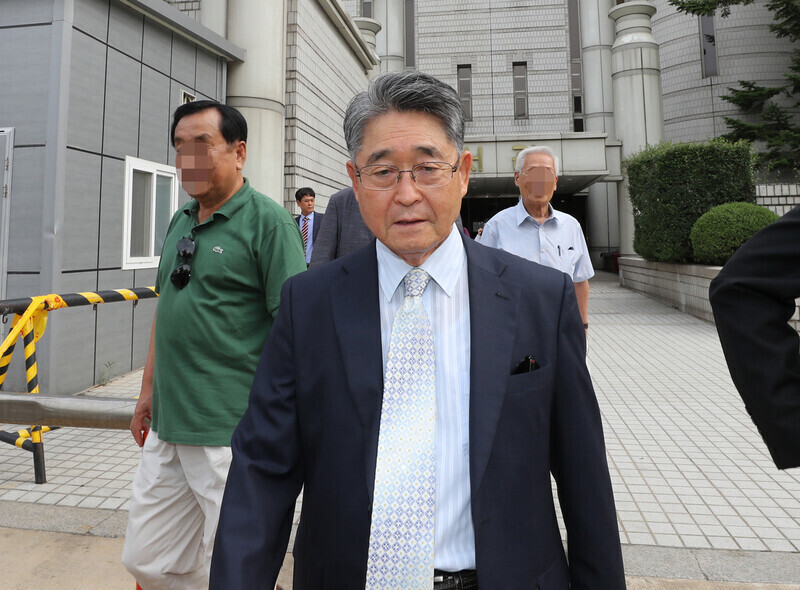hankyoreh
Links to other country sites 다른 나라 사이트 링크
Supreme Court confirms 2-year sentence to conservative commentator for defamatory comments on Gwangju Uprising

A prison sentence has been handed down to Jee Man-won, 81, who stood trial for defaming citizens who participated in the 1980 pro-democracy movement in Gwangju by referring to them as “North Korean soldiers.”
Although Jee had avoided being arrested in court at lower-level trials due to his advanced age, he is now expected to be formally detained soon.
On Thursday, the third division of the Supreme Court, headed by judge Noh Jeong-hee, confirmed the lower court’s sentence of two years imprisonment for Jee, who had been indicted on charges of violating the Act on Promotion of Information and Communications Network Utilization and Data Protection, defamation, and slander of the dead.
Jee is accused of calling Gwangju citizens who participated in the May 18 pro-democratic uprising “gwangsu,” or “North Korean special forces in Gwangju,” and for defaming the late Kim Sa-bok, a real figure who appeared in the movie “Taxi Driver,” as a “commie.”
Besides this, Jee was also charged with defaming the Gwangju Catholic diocese’s justice and peace committee by calling it “communist.”
The first trial sentenced Jee to two years in prison and a fine of 1 million won (US$803).
“It is recognized that [Jee’s actions] were meant to slander by denigrating the historical significance and value of the May 18 Gwangju Democratization Movement,” the court ruled at the time.
Regarding Jee, the second trial ruled that “the nature and circumstances of the crimes are bad, and the number of crimes is not small. [Jee] has not been forgiven by the victims and does not appear to be remorseful about these incidents.”
The court ended up sentencing Jee to two years imprisonment, concluding that “since the legal and historical evaluation of the May 18 Democratization Movement has been established, it does not look like the social assessment of the Movement will fundamentally change due to Jee's crimes.”
However, out of consideration for Jee's advanced age, he was not subject to court arrest.
The Supreme Court confirmed the lower court's verdict, saying the lower court's ruling was sound and had not violated any legal principles of logic or customary practice or gone beyond the scope of the principle of free evaluation of evidence.
The ruling that sentenced the defendant without detention to imprisonment has now been finalized. The only step left is for prosecutors to enforce the sentence.
By Shin Min-jung, staff reporter
Please direct questions or comments to [english@hani.co.kr]

Editorial・opinion
![[Column] Life on our Trisolaris [Column] Life on our Trisolaris](https://flexible.img.hani.co.kr/flexible/normal/500/300/imgdb/original/2024/0505/4817148682278544.jpg) [Column] Life on our Trisolaris
[Column] Life on our Trisolaris![[Editorial] Penalties for airing allegations against Korea’s first lady endanger free press [Editorial] Penalties for airing allegations against Korea’s first lady endanger free press](https://flexible.img.hani.co.kr/flexible/normal/500/300/imgdb/original/2024/0502/1817146398095106.jpg) [Editorial] Penalties for airing allegations against Korea’s first lady endanger free press
[Editorial] Penalties for airing allegations against Korea’s first lady endanger free press- [Editorial] Yoon must halt procurement of SM-3 interceptor missiles
- [Guest essay] Maybe Korea’s rapid population decline is an opportunity, not a crisis
- [Column] Can Yoon steer diplomacy with Russia, China back on track?
- [Column] Season 2 of special prosecutor probe may be coming to Korea soon
- [Column] Park Geun-hye déjà vu in Yoon Suk-yeol
- [Editorial] New weight of N. Korea’s nuclear threats makes dialogue all the more urgent
- [Guest essay] The real reason Korea’s new right wants to dub Rhee a founding father
- [Column] ‘Choson’: Is it time we start referring to N. Korea in its own terms?
Most viewed articles
- 1New sex-ed guidelines forbid teaching about homosexuality
- 2OECD upgrades Korea’s growth forecast from 2.2% to 2.6%
- 3[Column] Life on our Trisolaris
- 460% of young Koreans see no need to have kids after marriage
- 5Months and months of overdue wages are pushing migrant workers in Korea into debt
- 6Inside the law for a special counsel probe over a Korean Marine’s death
- 7Korean government’s compromise plan for medical reform swiftly rejected by doctors
- 8[Guest essay] Maybe Korea’s rapid population decline is an opportunity, not a crisis
- 9Trump asks why US would defend Korea, hints at hiking Seoul’s defense cost burden
- 10Two lung cancer deaths at Samsung Electronics deemed occupational in nature